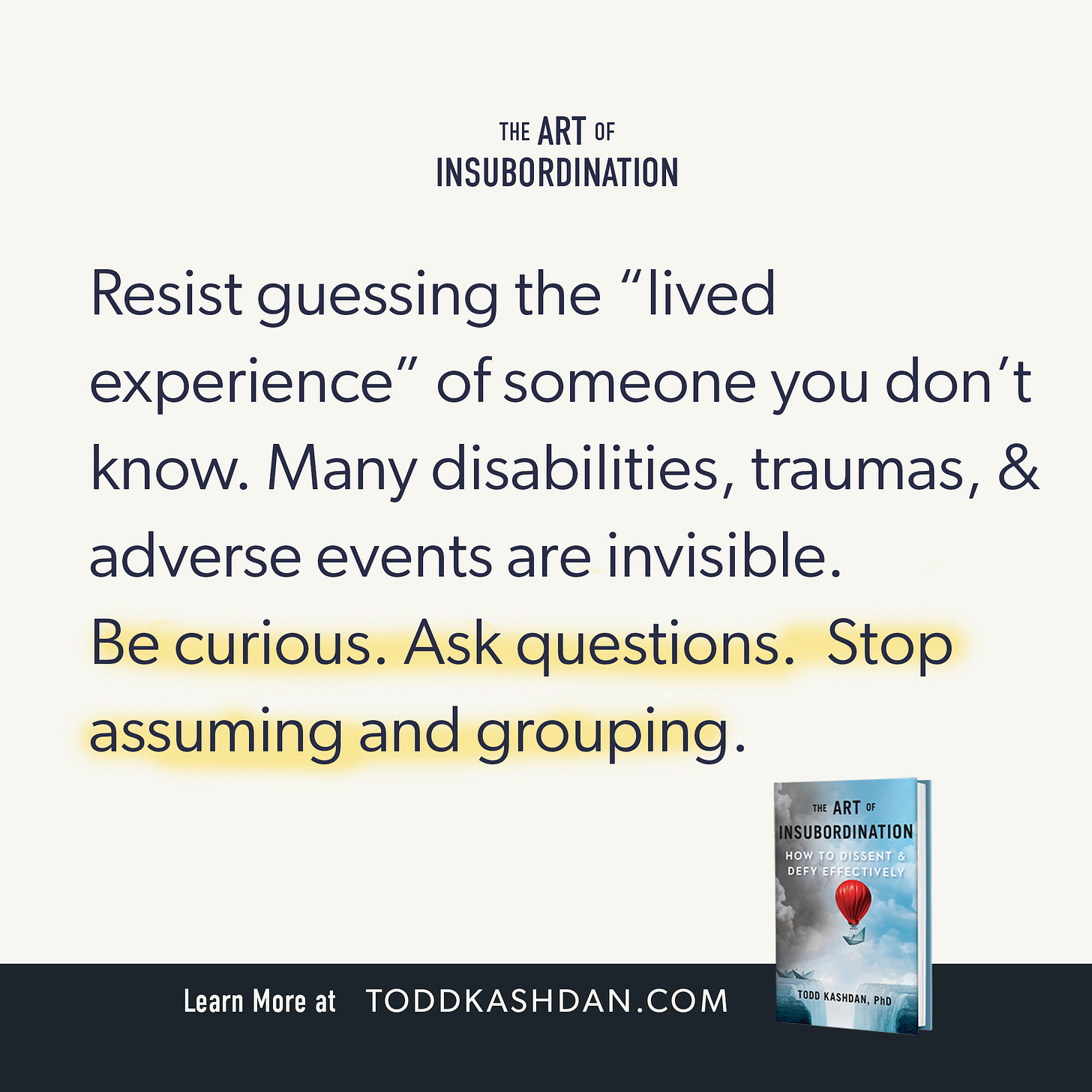Dissecting the New Trendy Term: "Lived Experiences"
Critical thinking about group comparisons and assumptions
Let's dissect the popular new term: “lived experience.” A term gaining traction in politics, schools, scientific discussions, and boardrooms.
Let’s start with a fact - you and I have no idea what the "lived experience" is of a person we don't know. Yet, the term is often used as a form of persuasive appeal - someone carries automatic wisdom because of their appearance, life events, or group affiliations. A quick visual scan to infer someone’s “lived experience” is essentially rapid stereotyping.
Women are not a homogenous group unless….you decide to group women together and compare them to men. This is much of what psychology and society does. Do this, and you find across 79 studies that women show greater interest in helping people while men prefer gadgets, cars, and tools. Yes, researchers found a large difference between the career interests of men and women. Yes, this matches stereotypes of how men and women differ. And still, despite this big-ass finding, compared with men, 25.1% of women possessed stronger interest in professions involving things (such as engineering, physics).
One out of every four women breaks the stereotype! The lesson: Do not ignore variability within a group. Assuming similar experiences for members of the same sex is a cultural step backwards.
Racial groups are not packs of interchangeable parts to be immediately classified and labeled. This is much of what psychology and society does. In a nationally representative study of 2,824 United States adults, compared with White men and women, Black men and women experienced higher levels of well-being on all six outcomes (self-acceptance, environmental mastery, purpose in life, positive relations with others, personal growth, and autonomy).1 Assuming an entire racial group fares better or worse than another is to ignore meaningful variability.
It is crude and erroneous to draw conclusions about an entire group. Consider the trend of claiming “people of color have a different lived experience as do women.” In what ways? How much do these variables influence who someone is and their potential? Inferential leaps based on superficial characteristics often cause more harm than good. Even if it’s a positive stereotype, you just added pressure that someone must perform as an exemplar representative of their group instead of offering freedom of expression. A statement captured beautifully by one of the greatest stereotype researchers on the planet, Dr. Claude Steele:
Some people of color and women will have different lived experiences than those of other sexes and races. Others will not. We will not know what percentage of a group shows similar experiences without being curious, asking questions, and acquiring information.
Before you assume a person or group possesses “lived experience” that’s more valuable than another (in terms of wisdom that can be imparted or unique benefits), consider alternatives. Someone can have an experience but articulates it poorly to others. Someone can have an experience but fail to reflect on it or learn much from it. Someone can have an experience and lack intelligent thought on it to be of aid to another person. And perhaps most importantly, you could have “lived experiences” but cannot overcome the human biases that prevent an accurate reflection of what happened. From memory distortions to motivated reasoning, our narratives are often filled with inaccurate details and questionable themes.
Just because you suffered from depression does not automatically mean you are uniquely qualified to design effective psychological interventions. Design thinking is an entire discipline! As an analogy, we know exceptional athletes often make terrible coaches. That said, I do think we should try to find people who can articulate experiences well, learned from them, think intelligently about them, worked to overcome cognitive biases in their memories and narratives, and understand they are a N of 1 and their unique experience may not lend itself in generalizing to others with a similar history. We once had an undercorrection problem and now we also have an overcorrection problem.
What concerns me is the assumption that we know more about people from first glance than in reality. After all:
How much do you know about someone’s childhood?
How much do you know about someone’s relationship with parents and peers?
How much do you know about someone’s economic difficulties as a child and adult?
What non-visible disabilities, traumas, and adversities exist?
Poverty.
Physical abuse.
Sexual abuse.
The early death of a parent.
Deafness.
Abandonment.
Ostracism.
Chronic pain.
Mental health problems.
This list contains “lived experiences” invisible to the outside world. These events may or may not contribute to someone’s personality or wisdom. Be generous in your assessments. Be careful with your assumptions. Treat people as singular individuals that you try to know through gradual, reciprocal self-disclosure. Groups are smarter and wiser with the intellectual humility that different, divergent members reside among us.
Please support my work by sharing (and click the free ❤️ button). Discover strategies for fixing cultural problems by reading The Art of Insubordination: How to Dissent and Defy Effectively.
Extra Curiosities
One of the wisest friends I know has a new book that I am digesting, Real-Time Leadership: Find Your Winning Moves When the Stakes Are High. It is phenomenal. It is a guidebook for how to be effective when time urgency and uncertainty peaks. I’ll be honest, most leadership books are terrible. Rehashed content from Harvard Business Review articles. This one has already been dog-eared, highlighted, and scribbled on such that I could never resell it. Click the link above and get an early copy.
And If You Missed the Last Issue…
I intentionally chose this large-scale study because the findings run counter to dominant narratives. I suspect many readers are checking for an alternative explanation. Imagine if the findings showed that Black Americans endorsed lower well-being than White Americans. In this case, I suspect results would be accepted at face value. In this case, we would be observing confirmation bias in action - where we passively accept evidence that fits our views but refuse counter evidence. If we are interested in the truth then we exhibit the same healthy skepticism of all findings regardless of the conclusions. In terms of the results, notably, the Black-White well-being gap remained even after accounting for group differences in education, income, and perceived discrimination. Please share your hypothesized explanations for these findings in the comments.






![Real-Time Leadership: Find Your Winning Moves When the Stakes Are High by [David Noble, Carol Kauffman, Marshall Goldsmith] Real-Time Leadership: Find Your Winning Moves When the Stakes Are High by [David Noble, Carol Kauffman, Marshall Goldsmith]](https://substackcdn.com/image/fetch/$s_!nmJh!,w_1456,c_limit,f_auto,q_auto:good,fl_progressive:steep/https%3A%2F%2Fsubstack-post-media.s3.amazonaws.com%2Fpublic%2Fimages%2Fdeb74e8a-89dc-4bad-ad8b-637aa83c66f9_332x500.jpeg)
